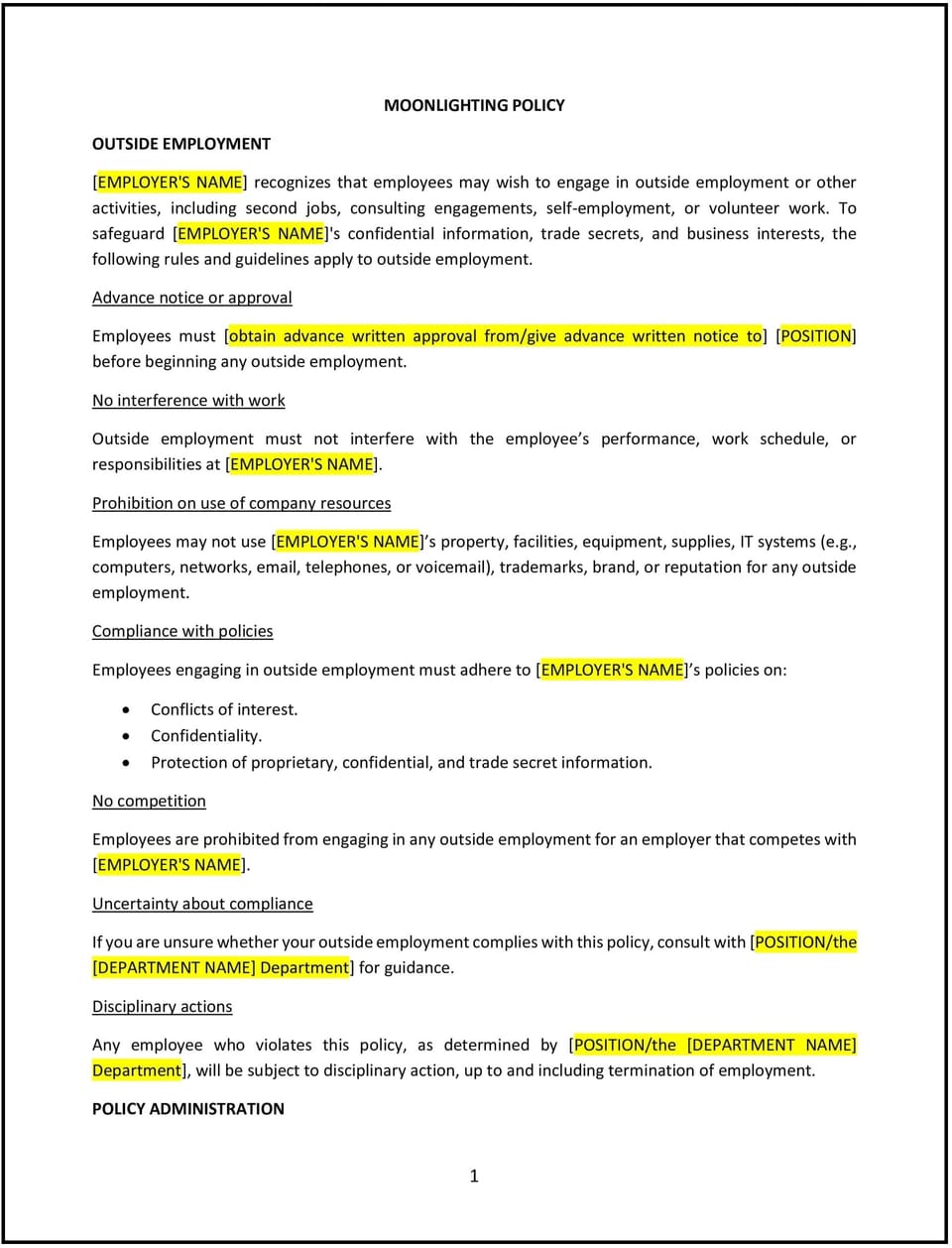Moonlighting policy (Alabama): Free template

Moonlighting policy (Alabama)
A moonlighting policy provides guidelines for employees who engage in secondary employment or business activities outside their primary job. For SMBs in Alabama, this policy ensures transparency, protects company interests, and helps employees balance their commitments responsibly.
This policy outlines acceptable parameters for outside work, potential conflicts of interest, and the disclosure process, fostering a clear understanding of expectations between employers and employees.
How to use this moonlighting policy (Alabama)
- Define moonlighting: Clearly explain what constitutes secondary employment or activities, such as freelance work, consulting, or owning a business.
- Set boundaries: Specify limitations, such as prohibiting outside work that competes with the company, impacts job performance, or uses company resources.
- Require disclosure: Establish a process for employees to inform management about their secondary employment or business activities for review.
- Address conflicts of interest: Provide examples of scenarios that could create conflicts, such as working for a competitor or using confidential information in outside work.
- Emphasize compliance: Reaffirm the importance of adhering to company policies, including confidentiality, intellectual property, and non-compete agreements.
Benefits of using a moonlighting policy (Alabama)
A moonlighting policy helps employers and employees maintain trust and accountability. Here’s how it helps:
- Protects company interests: Reduces risks associated with conflicts of interest, misuse of resources, or divided loyalties.
- Promotes transparency: Encourages open communication about outside activities to avoid misunderstandings.
- Maintains productivity: Ensures secondary employment does not interfere with primary job performance or responsibilities.
- Builds trust: Establishes clear expectations, fostering a positive and respectful work environment.
- Supports compliance: Aligns with legal and contractual obligations, minimizing risks related to intellectual property or confidentiality breaches.
Tips for implementing a moonlighting policy (Alabama)
- Communicate clearly: Regularly remind employees about the policy during onboarding and through company updates or meetings.
- Encourage transparency: Create a safe and open environment where employees feel comfortable disclosing their outside activities.
- Review disclosures promptly: Ensure timely review of moonlighting disclosures to provide employees with clear feedback and approvals.
- Address issues early: If an outside activity creates a conflict, work with the employee to resolve the situation fairly and collaboratively.
- Regularly review the policy: Update the policy periodically to reflect changes in company priorities, legal standards, or industry practices.
Q: What activities are considered moonlighting under this policy?
A: Moonlighting includes any secondary employment, freelance work, or business activity undertaken outside the employee’s primary job with the company.
Q: Do employees need to disclose all outside activities?
A: Employees are required to disclose outside activities that may conflict with company interests, affect job performance, or involve company resources.
Q: Can employees work for a competitor under this policy?
A: No, working for a competitor is generally prohibited to avoid conflicts of interest or breaches of confidentiality.
Q: How does the company review disclosures?
A: Disclosures are reviewed by HR or management to assess potential conflicts and determine whether the activity is permissible under the policy.
Q: Are there penalties for violating this policy?
A: Violations may result in disciplinary actions, including termination, depending on the severity of the breach and its impact on the company.
Q: Does this policy apply to part-time employees?
A: Yes, the policy applies to all employees, including part-time staff, to ensure consistent standards for secondary employment activities.
This article contains general legal information and does not contain legal advice. Cobrief is not a law firm or a substitute for an attorney or law firm. The law is complex and changes often. For legal advice, please ask a lawyer.


